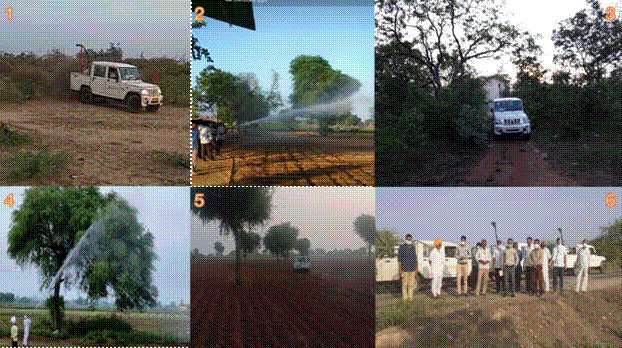Ministry of Agriculture &
Farmers Welfare
Locust control operations carried out in more than 2.75 lakh hectares area in the states of Rajasthan, Madhya Pradesh, Punjab, Gujarat, Uttar Pradesh, Maharashtra, Chhatisgarh, Haryana and Bihar from 11th April till 6th July 2020
Aerial spraying capacity strengthened for anti-locust operations; Along with a Bell helicopter deployed in Rajasthan, Indian Air Force has also conducted trials in anti-locust operations by using an Mi-17 helicopter
Further, 5 companies with 15 drones are deployed at Barmer, Jaisalmer, Bikaner, Nagaur and Phalodi in Rajasthan for locust control on tall trees and in inaccessible areas
प्रविष्टि तिथि:
07 JUL 2020 7:32PM by PIB Delhi
Starting from 11thApril 2020 till 6th July 2020, control operations have been done in 1,43,422hectares area in States of Rajasthan, Madhya Pradesh, Punjab, Gujarat, Uttar Pradesh and Haryana by Locust Circle Offices (LCOs). Till 6thJuly 2020, control operations have also been done in 1,32,465 hectares area in States of Rajasthan, Madhya Pradesh, Punjab, Gujarat, Uttar Pradesh, Maharashtra, Chhatisgarh, Haryana and Bihar by State Governments.
In the intervening night of 6th-7thJuly 2020, control operations were carried out at 22 places in 7 districts viz.Barmer, Bikaner, Jodhpur, Nagaur, Ajmer, Sikar and Jaipur of Rajasthan State and 1 place each in Jhansi district of Uttar Pradesh and Tikamgarh districts of Madhya Pradesh by LCOs. Besides this, State Agriculture Department of Uttar Pradesh also carried out control operations at 3 places in Jhansi district, while that of Madhya Pradesh State Agriculture Department at 1 place in Tikamgarh district, in the intervening night of 6th-7th July 2020 against small groups and scattered population of locusts.
Aerial spraying capacity has been strengthened for anti-locust operations. A Bell helicopter has been deployed in Rajasthan for use in Scheduled Desert Area as per the need. Indian Air Force also has conducted trials in anti-locust operation by using an Mi-17 helicopter. The results are encouraging. IAF started participating in anti-locust operations from 5th July by deploying the Mi-17 helicopter for aerial spraying in Jodhpur district. This is first of its kind event in the history of locust control in India.
Further, 5 companies with 15 drones are deployed at Barmer, Jaisalmer, Bikaner, Nagaur and Phalodi in Rajasthan for effective control of locusts on tall trees and in inaccessible areas through spraying of pesticides. India is the first Country that is using drones for locust control. On 21st May, 2020 MoCA granted conditional exemption to the Government Entity for use of remotely Piloted Air Craft System for anti-locust operations subject to various terms and conditions. Further, on 27th June, 2020, MoCA further relaxed the terms and conditions and permitted the use of engine-powered drone up to 50kg and use of drones during night times also for anti-locust operations.
Presently 60 control teams with spray vehicles are deputed /deployed in State of Rajasthan, Gujarat, Madhya Pradesh and Uttar Pradesh and more than 200 Central Government personnel are engaged in locust control operations. In addition, today 20 spray equipments have reached India.

- LWO control vehicle in action in Jhalamand, Jodhpur
- Locust control operation at Viratnagar, Jaipur, Rajasthan
- LWO control vehicle in operation in Shivpuri, Madhya Pradesh
- Spraying for locust control at Chirgaon, Jhansi, Uttar Pradesh
- LWO control operation at Marwa on Jaipur-Ajmer district border, Rajasthan
- A party of Locust warriors in Nagaur, Rajasthan
No significant crop losses have been reported in the States of Gujarat, Uttar Pradesh, Madhya Pradesh, Maharashtra, Chhatisgarh, Bihar and Haryana. However, some minor crop losses have been reported in some districts of Rajasthan
Today (07.07.2020), swarms of immature pink locusts and adult yellow locusts are active in Barmer, Bikaner, Jodhpur, Nagaur, Ajmer, Sikar and Jaipur districts of Rajasthan State, Jhansi district of Uttar Pradesh and in Tikamgarh districts of Madhya Pradesh.
As per the Food and Agriculture Organization’s Locust Status Update of 03.07.2020, many of the spring-bred swarms that migrated to Indo-Pak border before the monsoon rains, some continued east to northern states of India and a few groups reached Nepal. The forecast is that these swarms will return to Rajasthan with the start of the monsoon in the coming days to join other swarms still arriving from Iran and Pakistan, which is expected to be supplemented by swarms from the Horn of Africa in about mid-July. Early breeding has already occurred along the Indo-Pak border where substantial hatching and band formation will take place in July that will cause the first-generation summer swarms to form in mid-August.
Weekly virtual meeting on Desert Locust of South-West Asian countries (Afghanistan, India, Iran and Pakistan) is being organised by FAO. 15 virtual meetings of the technical officers of South West Asian countries have taken place so far.
***
APS/SG
(रिलीज़ आईडी: 1637040)
आगंतुक पटल : 970